12 years ago
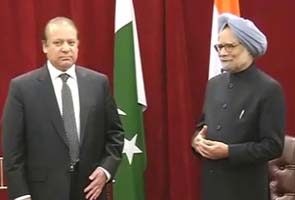 'Dehati aurat' controversy: how Nawaz Sharif allegedly sent denial to Manmohan Singh
'Dehati aurat' controversy: how Nawaz Sharif allegedly sent denial to Manmohan SinghThe "dehati aurat" comment attributed to him reportedly deeply upset Pakistan Prime Minister Nawaz Sharif who swung into damage control mode, sending a message to Prime Minister Manmohan Singh, saying he never used such language against him.
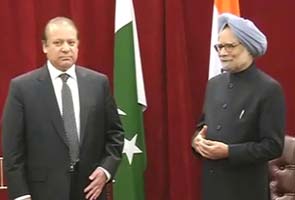 BJP regrets Manmohan Singh- Nawaz Sharif meet despite continued terrorism
BJP regrets Manmohan Singh- Nawaz Sharif meet despite continued terrorism BJP today regretted Prime Minister Manmohan Singh's decision to meet his Pakistani counterpart Nawaz Sharif in New York despite continuing terror attacks in Jammu and Kashmir.
NSA briefing on the Dr Singh-Sharif meeting:
- PM-Nawaz Sharif met for a little over an hour
- Reviewed the state of the relationship between India and Pakistan
- Discussed steps necessary
- Decided to task the DGMOs to suggest effective means to restore ceasefire and ensure that it stays in place
- PM mentioned terrorism and the need for effective action
- All that would be possible once dealt with immediate issues we face today
- Siachen, Sir Creek also mentioned by Mr Sharif
- It was useful as it provided a high-level meeting to address several issues
- PM Nawaz Sharif said Pakistan's intention is to bring to book perpetrators of 26/11 attacks. He said there would be action on Mumbai cases now that the judicial commission has been in India and gathered depositions
- The basic understanding emerging from the meeting was that trade, etc would be possible once we have dealt with basic issues emanating from today
- Overall impression: meeting was useful as it provided an opportunity for high-level contact
- Both sides wish to see a better India-Pakistan relationship than we have today
- From our point of view, an issue that is very important is addressing terrorism
- Shiv Shankar Menon on a Q - "lachak? That's you interpretation "
- In order to get to composite dialogue, we need to deal with issues that we face today like ceasefire violations and terrorism'
- I am not an astrologer, can't tell you when it will happen
- No decision on when there will be a meeting again. As for how useful the talks were, we'll only know in the months to come
- PM Sharif invited Dr Singh to visit Pakistan. PM Singh invited Pm Sharif to visit Pak. Both have accepted but no dates have been decided upon.
- India raised funding of Jamaat-ud-Dawa by Pakistan's Punjab government
Meeting between Dr Manmohan Singh and Nawaz Sharif ends. The two prime ministers met for a little over an hour.
In front of flags of the two nations, Dr Manmohan Singh and Nawaz Sharif shook hands and made small talk before entering closed-door talks with aides
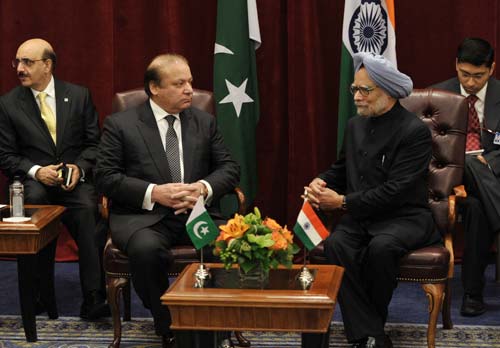

Nawaz Sharif formally invites Dr Singh to visit Pakistan
Prime Minister Manmohan Singh and his Pakistani counterpart discussed ways to normalise bilateral ties, in the grim backdrop of India's concerns over continued terrorism emanating from Pakistan.
During the meeting on the sidelines of UN General Assembly, Dr Singh raised the issue of terrorism emanating from Pakistani soil and asked Islamabad to do more to curb the cross-border terrorism.
During the meeting on the sidelines of UN General Assembly, Dr Singh raised the issue of terrorism emanating from Pakistani soil and asked Islamabad to do more to curb the cross-border terrorism.
 PM Manmohan Singh meets Nawaz Sharif amid political pressure, controversy
PM Manmohan Singh meets Nawaz Sharif amid political pressure, controversyPrime Minister Manmohan Singh is holding his first one-on-one meeting with his Pakistani counterpart Nawaz Sharif in New York. The meeting comes against the backdrop of India's growing concern over terror attacks emanating from Pakistan.
The two prime ministers shook hands as they started talks
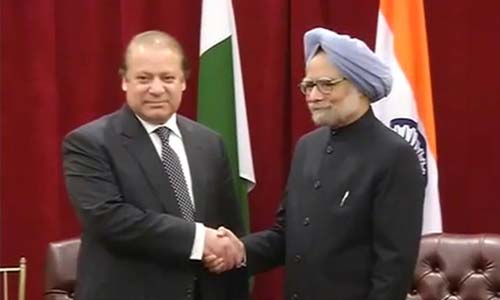

Happening Now: Prime Minister Dr Manmohan Singh starts talks with Prime Minister Nawaz Sharif of Pakistan pic.twitter.com/cSRPdHSZN6
- Dr Manmohan Singh (@PMOIndia) September 29, 2013
Meeting between PM Manmohan Singh and Nawaz Sharif begins in New York
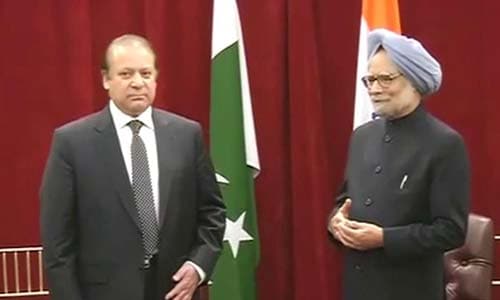

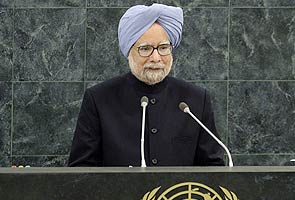 Ahead of talks with Nawaz Sharif, PM talks tough on terror
Ahead of talks with Nawaz Sharif, PM talks tough on terrorPrime Minister Manmohan Singh will hold his first one-on-one meeting with his Pakistani counterpart Nawaz Sharif in New York this evening. The meeting comes against the backdrop of India's growing concern over terror attacks emanating from Pakistan.
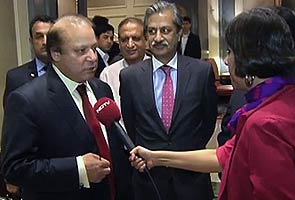 Need to pick up threads broken in 1999: Nawaz Sharif to NDTV
Need to pick up threads broken in 1999: Nawaz Sharif to NDTVWith Prime Minister Manmohan Singh saying that the "epicentre of terrorism remains focused in Pakistan", the stage has been set for a crucial, and possibly tense, meeting with Pakistani Prime Minister Nawaz Sharif.
 Manmohan Singh is a good man, Nawaz Sharif tells NDTV
Manmohan Singh is a good man, Nawaz Sharif tells NDTVIn an exclusive interview to NDTV ahead of his meeting with Prime Minister Manmohan Singh, Pakistan PM Nawaz Sharif said the terror strike in Jammu is extremely unfortunate, but the dialogue process between the two neighbours should not be derailed.
Read highlights of the interview here: http://bit.ly/163krQT
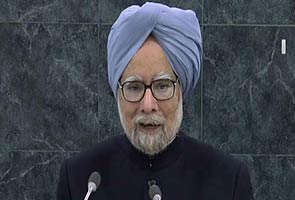 United Nations must be reformed to reflect political realities: PM Manmohan Singh
United Nations must be reformed to reflect political realities: PM Manmohan SinghMaking a strong case for the reform of the UN Security Council to reflect current political realities, Prime Minister Manmohan Singh today said global peace and security issues must be handled through multilateral efforts.
 Terror machinery that draws sustenance from Pakistan must be shut down: PM
Terror machinery that draws sustenance from Pakistan must be shut down: PMIn a hard-hitting speech, Prime Minister Manmohan Singh today asked Pakistan to shut down "terrorist machinery" on its soil while making it clear that there can "never, ever" be a compromise on the territorial integrity of India of which Jammu and Kashmir is an integral part.
Full text of PM's statement at UN General Assembly
Addressing the United Nations General Assembly today, Prime Minister Manmohan Singh said India is committed to resolving all issues with Pakistan, but for progress, it is imperative that the territory of Pakistan is not utilised for aiding and abetting terrorism directed against India.
Addressing the United Nations General Assembly today, Prime Minister Manmohan Singh said India is committed to resolving all issues with Pakistan, but for progress, it is imperative that the territory of Pakistan is not utilised for aiding and abetting terrorism directed against India.
PM Manmohan Singh on terrorism and Pakistan at the UN General Assembly:
- Terrorism remains a grave threat to security and stability everywhere
- State-sponsored cross-border terrorism is of particular concern to India
- The epicentre of terrorism in our region is located in our neighbourhood in Pakistan
- Prime Minister Nawaz Sharif of Pakistan spoke of making a new beginning. I reciprocate his sentiments
- Look forward to meeting Pak PM Nawaz Sharif tomorrow
- India is committed sincerely to resolving all issues with Pakistan, including the issue of Jammu and Kashmir
- Terrorist machinery that draws its sustenance from Pakistan be shut down
- There must be a clear understanding of the fact Jammu and Kashmir is an integral part of India
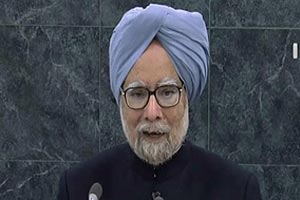
Prime Minister Manmohan Singh is addressing the United Nations General Assembly. Following are the highlights:
- Renewed attention on the role of the United Nations in advancing international peace, security and prosperity
- Countries are now not only more interdependent, but also face new and increasingly complex challenges
- The UN Security Council must be reformed and restructured; more developing countries should be included
- A lingering global economic slowdown and continuing volatility in financial markets have imposed disproportionately heavy costs on developing countries
- Poverty remains a major political and economic challenge and its eradication requires special attention and a new thrust
- Growth and inclusive development are naturally important for all our countries
- Growth requires supportive international economic environment, enhanced investment flows
- Problems of over a billion people living in abject poverty around the world need to be attacked more directly
- Issues of peace, security, human rights and governance are important and need to be addressed
- Important that the UN set clear and concise goals and provide practical and well-defined means of implementation
- UN should take the views of developing countries into account
- Especially critical is women's equal access to economic opportunities
- Important that women do not become victims of violence or targets of prejudice
- India is proud of its partnerships with developing countries
- India and Africa are engaging through the India-Africa Forum Summit process
- We are committed to building 100 institutions in Africa
- India has made available concessional assistance of over 9.5 billion US dollars to Africa
- Must summon the necessary political will for crafting a robust global response to climate change
- We are deeply concerned about the future of West Asia
- Conflict in Syria is not only a tragedy for the people of Syria, but also threatens stability and security in the region and beyond
- India supports strongly the elimination of chemical weapons material and equipment in Syria
- Must intensify efforts to end conflict in Syria and seek a political settlement
- India supports an early realisation of a sovereign, independent, viable and united State of Palestine, with East Jerusalem as its capital
PM Manmohan Singh to address the 68th session of the United Nations General Assembly shortly.
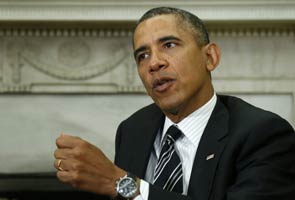 Barack Obama says Pakistan-based Lashkar-e-Taiba a worldwide terror threat: sources
Barack Obama says Pakistan-based Lashkar-e-Taiba a worldwide terror threat: sourcesUS President Barack Obama, in his meeting with Prime Minister Manmohan Singh on Friday, reportedly said that there's a worldwide terror threat from Pakistan-based Lashkar-e-Taiba that is accused of masterminding the 26/11 attacks in Mumbai.
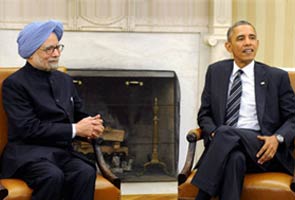 India, US ask Pakistan to bring 26/11 perpetrators to justice
India, US ask Pakistan to bring 26/11 perpetrators to justiceHere is the full text of the Joint Statement:
"September 27, 2013
The Prime Minister of India Dr. Manmohan Singh and the President of the United States of America Barack Obama met this morning followed by a working luncheon at the White House. Marking their third bilateral summit, the two leaders reflected proudly on the transformation of United States-India relations during the last decade, affirming that the partnership between the two democratic nations is stronger today than at any point in their 67-year history.
Rooted in common democratic values and strong people to people ties, the United States and India have developed a comprehensive global strategic partnership, both in name and in substance that has made their citizens safer and more prosperous.
President Obama and Prime Minister Singh pledged to make the next decade equally as transformative, challenging their governments to reach the full potential of this partnership, particularly in the areas of security cooperation, bilateral trade and investment, energy and environment, higher education, and global architecture.
The Leaders called for expanding security cooperation between the United States and India to address 21stcentury challenges in the areas of counter-terrorism, cyber, space, and global health security.
Applauding bilateral defence cooperation, including trade and military exercises, President Obama and Prime Minister Singh expressed satisfaction with the progress achieved to date in defence relations. They emphasised the need for more intensive defence cooperation on both sides.
The Leaders reaffirmed their desire to further strengthen defence trade cooperation endorsing a Joint Declaration on Defence Cooperation* as a means of enhancing their partnership in defence technology transfer, joint research, co-development and co-production.
President Obama encouraged the further participation of US firms in partnering India's efforts to enhance its defence capacities. President Obama also welcomed India's decision to participate in the Rim of the Pacific (RIMPAC) naval exercise hosted by US Pacific Command in 2014.
Affirming their deep concern over the continuing threat posed by terrorism, President Obama and Prime Minister Singh stressed the need for joint and concerted effort, including dismantling of terrorist safe havens, and disrupting all financial and tactical support for terrorism.
The Leaders decided to significantly expand information sharing and intelligence cooperation to address threats to their respective nations including strengthening the bilateral relationship to exchange information on known and suspected terrorists.
The Leaders emphasised the importance of expanding homeland security cooperation to enhance exchanges on megacity policing strategies, securing the global supply chain and anti-counterfeiting efforts.
India welcomed the US offer of membership in the US 'Global Entry' Trusted Traveller Network Program, to facilitate expedited entry of Indian travellers to the United States.
Noting that two-way trade has increased fivefold since 2001 to nearly $100 billion, President Obama and Prime Minister Singh agreed that there are no insurmountable impediments to bilateral trade increasing an additional five-fold.
President Obama expressed confidence that the ongoing Indian economic reforms and policy measures to liberalise India's economy would accelerate economic growth, opening greater avenues for trade and creating jobs in both countries.
In this respect, the leaders recognised in particular the role and contribution of the Indian and US Information Technology industry and the IT enabled service industry in strengthening India-US trade and investment relations.
The Leaders reaffirmed their commitment to concluding a high-standard Bilateral Investment Treaty that will foster openness to investment, transparency, and predictability, and thereby support economic growth and job creation in both countries.
The Leaders welcomed progress towards increased engagement by experts from both governments, underlining the need for expeditious progress to address all trade and investment policy issues of bilateral concern so as to remove obstacles and improve the business environment in both countries. In this respect, both sides agreed to consider establishing a Joint Committee on Investment in Manufacturing.
The Leaders also committed their officials to work toward a successful outcome at the World Trade Organization Ministerial Conference in Bali.
The Leaders welcomed the robust cooperation in cutting-edge scientific research and joint collaboration in science, innovation, and entrepreneurship, for the benefit of citizens in both countries. The United States welcomed the invitation by India for the United States to be Partner Country in India's Science and Technology Summit in 2014.
President Obama and Prime Minister Singh discussed ways to strengthen bilateral efforts to promote energy efficiency, clean energy, and address climate change.
In the civil nuclear power sector, President Obama and Prime Minister Singh noted that, with government-to-government procedures agreed, commercial negotiations between US companies and the Nuclear Power Corporation of India (NPCIL) are proceeding.
They welcomed the announcement that NPCIL and US nuclear company Westinghouse have concluded a Preliminary Contract to develop a nuclear power plant in Gujarat in India.
Building on this, the Leaders urged NPCIL and US companies Westinghouse and General Electric-Hitachi to expedite the necessary work to establish nuclear power plants in Gujarat and Andhra Pradesh. Both sides reaffirm their commitment to the full and timely implementation of the India-US Civil Nuclear Cooperation Agreement.
The US-India Partnership to Advance Clean Energy (PACE), launched by the two leaders in 2009, is expected to pave the way for energy to millions of Indian households.
To expand the availability of clean energy resources to more people, President Obama and Prime Minister Singh endorsed the proposal to launch Promoting Energy Access through Clean Energy (PEACE), a PACE initiative, to rapidly deploy innovative renewable energy solutions to those who currently lack access to energy.
Recognising that climate change is a defining challenge of our time and that there are mutual benefits to intensifying cooperation, President Obama and Prime Minister Singh announced the establishment of an India-US Climate Change Working Group to develop and advance action-oriented cooperation, as well as to begin an enhanced dialogue focusing on working closely in developing an ambitious climate change agreement for the post-2020 period, and on strengthening bilateral efforts in this regard.
The two leaders agreed to immediately convene the India-US Task Force on hydrofluorocarbons (HFCs) to discuss, inter alia, multilateral approaches that include using the expertise and the institutions of the Montreal Protocol to phase down the consumption and production of HFCs, based on economically-viable and technically feasible alternatives, and include HFCs within the scope of the United Nations Framework Convention on Climate Change (UNFCCC) and its Kyoto Protocol for accounting and reporting of emissions.
The Leaders are committed to support the full implementation of the agreed outcomes under the UNFCCC with its ongoing negotiations. They strongly welcomed the efforts of the Secretary-General of the United Nations to mobilise political will through 2014 towards the successful adoption of a protocol, another legal instrument, or an agreed outcome with legal force under the convention applicable to all parties by 2015, during COP-21 that France stands ready to host.
They also supported complimentary initiatives, through multilateral approaches that include using the expertise and the institutions of the Montreal Protocol to phase down the production and the consumption of HFCs, based on the examination of economically viable and technically feasible alternatives.
They will continue to include HFCs within the scope of UNFCCC and its Kyoto protocol for accounting and reporting of emissions.
President Obama and Prime Minister Singh emphasized the dangers that high oil prices can pose to the global economy and the need to increase oil market transparency and emergency response collaboration, through closer coordination and bilateral dialogue.
President Obama and Prime Minister Singh believe that the United States and India should look to each other as partners of first resort in addressing global challenges.
The leaders reflected on the important strategic partnerships the United States and India have formed with Afghanistan, reaffirming their commitment to supporting a smooth security and political transition.
The leaders recognised that violent extremists continue to pose challenges to Afghanistan's security and stability and, in this context, emphasised the need for coordinated international support to help build the capacity of Afghan National Defense and Security Forces.
They noted that both India and the US will remain committed to contribute to peace, stability and development in Afghanistan during the critical transformation decade (2015-2024).
President Obama and Prime Minister Singh strongly condemned the September 26 terrorist attack in Samba in Jammu and Kashmir. They reiterated their condemnation of terrorism in all its forms, and reaffirmed their commitment to eliminating terrorist safe havens and infrastructure, and disrupting terrorist networks including Al-Qaeda and the Lashkar-e-Taiba.
The leaders called for Pakistan to work toward bringing the perpetrators of the November 2008 Mumbai attacks to justice.
In the spirit of their continuing non-proliferation cooperation, the Leaders reviewed the close cooperation of the United States and India to realise India's intention of joining the multilateral export control regimes.
The president reaffirmed the US support for India's early membership in these groups. Looking ahead to the 2014 Nuclear Security Summit in The Hague, India and the US also will deepen their cooperation, including through the 2010 Memorandum of Understanding with India's Global Centre for Nuclear Energy Partnership, to strengthen global nuclear security.
The leaders stressed the need for diplomacy to resolve outstanding issues relating to Iran's nuclear programme, and called on Iran to comply with its IAEA and UN Security Council obligations.
The two Leaders also deplored the use of chemical weapons in Syria, stressing that the global norm against the use of chemical weapons by anyone and anywhere must be maintained.
Consistent with the US rebalance to Asia and India's Look East policy, the Leaders expressed a desire to partner more closely with other Asia-Pacific countries, including greater coordination with Japan, China and ASEAN, among others, including through the evolving institutional architecture of the region.
The Leaders share a commitment to support regional multilateral institutions as they continue to develop into effective bodies built on international rules and norms that can address shared challenges.
Noting the contributions of Indian peacekeepers to global peace and stability for sixty years, the Leaders decided to expand their United Nations peacekeeping cooperation, including capacity-building efforts with third countries.
Reaffirming that in the years ahead, the US looks forward to a reformed UN Security Council with India as a permanent member, President Obama and Prime Minister Singh agreed that both their nations bear a responsibility to ensure that the Security Council continues to effectively play the role in maintaining international peace and security envisioned in the UN Charter.
Building on ongoing consultations between India and the US on East Asia, Central Asia and West Asia, and the trilateral dialogue mechanisms with Afghanistan and Japan respectively, the leaders agreed to expand their consultations to include a dialogue on the Indian Ocean Region, to deepen coordination on cross-cutting issues including maritime security and conservation of natural resources.
The leaders resolved to work together to end extreme poverty, including through expanding efforts to end preventable child deaths through the Child Survival Call to Action.
Fifty years after the launch of India's own agricultural "Green Revolution", the leaders applauded their countries' work together with African partners Kenya, Malawi, and Liberia, to provide capacity building and exchange best practices for food security.
Looking forward, President Obama and Prime Minister Singh recognised that increased cooperation in these areas will strengthen the United States-India strategic partnership, highlighting shared democratic values and the capabilities the US and India have to work together across Asia and around the globe.
The two countries have crossed a threshold in their relations where both recognize that successes at home and abroad are further advanced by their cooperation.
Today's meeting demonstrates that the interests of the United States and India continue to converge, and this partnership will indeed be a defining one for the 21st Century."
India, US agree to identify joint defence projects in a year
As part of their effort to enhance defence engagements, India and the US have agreed to identify areas of cooperative and collaborative projects in advance defence technologies and systems in the next one year.
As part of their effort to enhance defence engagements, India and the US have agreed to identify areas of cooperative and collaborative projects in advance defence technologies and systems in the next one year.
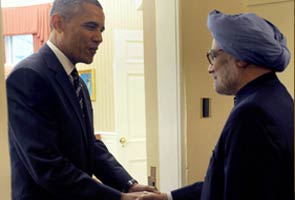 PM, Obama reaffirm commitment to eliminate terror safe havens
PM, Obama reaffirm commitment to eliminate terror safe havensThe US today joined India in condemning the terror strike in Jammu and Kashmir, with the two countries vowing to consolidate their efforts to eliminate terrorist safe havens and calling on Pakistan to bring to justice the perpetrators of the 2008 Mumbai attack.
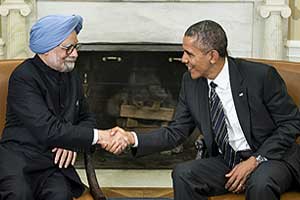
Prime Minister Manmohan Singh (L) shakes hands with US President Barack Obama in the Oval Office of the White House
 PM tones down hopes for talks with Nawaz Sharif
PM tones down hopes for talks with Nawaz SharifPrime Minister Manmohan Singh has said he is looking forward to meeting his Pakistani counterpart Nawaz Sharif, but expectations for the talks should be toned down.
Barack Obama on his talks with Dr Singh:
- We have been able to achieve an agreement between US company and India on civilian nuclear power
- As recently as the last few days, India continues to suffer from terror attacks. Our hearts go out to the families of those who lost their lives
- Discussed tensions in the sub-continent. We share a common interest in Afghanistan, rights of Afghan women, elections there
- Thank PM Manmohan Singh for his continued interest in improving cooperation between India and Pakistan
Prime Minister Manmohan Singh says:
- We have discussed our relations with Afghanistan and Pakistan
- Explained the difficulty we face given the fact that the epicentre of terror remains Pakistan
- Look forward to meeting Nawaz Sharif even though expectations have to be toned down
- India and America are working together to give our cooperation a new sense of purpose
- Outside the area of trade, technology and investment, we are exploring new areas of cooperation
- Cooperation with regard to defence, intelligence sharing and gathering
- President briefed me about his initiatives on Syria and Iran and I complemented his vision in giving diplomacy yet another chance
- India supports peace initiatives in the middle-east
PM at Oval Office: We had wide ranging discussions on widening, deepening and strengthening our relationship. pic.twitter.com/MawJGHt4Yp
- Dr Manmohan Singh (@PMOIndia) September 27, 2013
Prime Minister Dr Manmohan Singh meets President Barack Obama at the Oval Office. pic.twitter.com/KIDnMJ12I7
- Dr Manmohan Singh (@PMOIndia) September 27, 2013
Prime Minister Manmohan Singh meets Barack Obama at the White House
Prime Minister Manmohan Singh today held talks with US President Barack Obama, the first bilateral summit meeting after nearly three years.
Prime Minister Manmohan Singh today held talks with US President Barack Obama, the first bilateral summit meeting after nearly three years.
PM arrives at the White House. PM-Obama joint statement likely at around 10 pm IST.
Before the meeting between the Prime Ministers of India and Pakistan, terror struck Jammu and Kashmir as three terrorists stormed a police station and then an Army camp. Ten people were killed, including four soldiers. So how will this terror strike impact the PM's US trip? NDTV's Group Editor Barkha Dutt conduct this special discussion from Washington, DC.
India's pact with US N-supplier may miss PM-Obama meeting deadline
A major pact between India's nuclear power corporation and American nuclear supplier Westinghouse for a power plant in Gujarat has failed to take off in time for Prime Minister Manmohan Singh's meeting with US President Barack Obama despite New Delhi's last minute push to close the deal.
A major pact between India's nuclear power corporation and American nuclear supplier Westinghouse for a power plant in Gujarat has failed to take off in time for Prime Minister Manmohan Singh's meeting with US President Barack Obama despite New Delhi's last minute push to close the deal.
PM to meet Obama a day after J&K attacks, talks on Hafiz Saeed, Lashkar on agenda
Terror groups operating from Pakistan will be high on the agenda when Prime Minister Manmohan Singh meets US President Barack Obama at the White House today, a day after terror strikes in Jammu and Kashmir led to opposition demands to scrap the PM-Nawaz Sharif meet on Sunday.
Terror groups operating from Pakistan will be high on the agenda when Prime Minister Manmohan Singh meets US President Barack Obama at the White House today, a day after terror strikes in Jammu and Kashmir led to opposition demands to scrap the PM-Nawaz Sharif meet on Sunday.
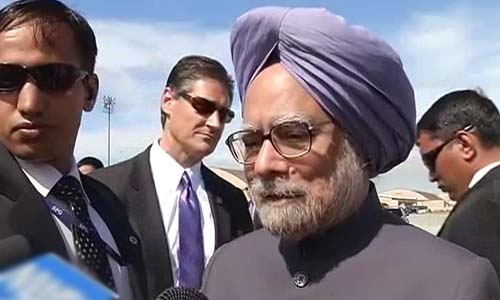
PM speaks at the Andrews Air Force Base in Washington:
"During President Obama's regime, we have taken several steps to widen and deepen this partnership in diverse way and during this visit we will review the progress that has been made and also what further can be done to give added meaning and content to this partnership. United States is India's one of the most important trading partners. It is also an important technological support for India's development and we need the US on our side as we give a new, added thrust to our development programmes. We'll also review the international situation, particularly with regard to international economic situation, situation in the South East Asian region, the Middle East and West Asia."
JUST IN:
Prime Minister Manmohan Singh lands in Washington.
Prime Minister Manmohan Singh lands in Washington.
Sombre mood on PM's flight, no birthday celebrations in the light of J&K terror attacks
(From NDTV's Group Editor Barkha Dutt who is travelling with the PM's delegation to Washington ahead of the UN General Assembly meeting on the weekend)
(From NDTV's Group Editor Barkha Dutt who is travelling with the PM's delegation to Washington ahead of the UN General Assembly meeting on the weekend)
Here's the full text of PM's statement
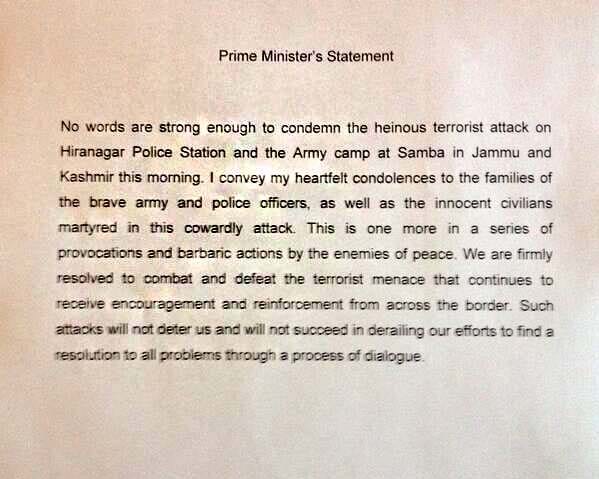

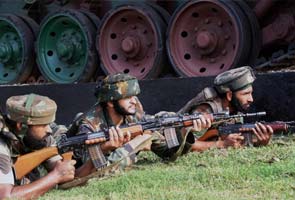 J&K attacks: PM condemns 'attack on peace', says it won't derail dialogue with Pakistan
J&K attacks: PM condemns 'attack on peace', says it won't derail dialogue with PakistanPrime Minister Manmohan Singh and his delegation were woken up in Frankfurt with the news of the terror strikes unfolding back home in Jammu and Kashmir. So far, an uncertain silence has prevailed; we are still awaiting the first formal response to the strikes and what impact it may have on the summit meeting between him and Nawaz Sharif on Sunday.
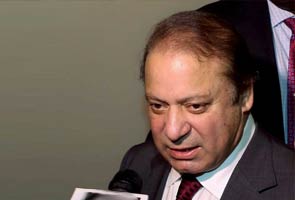 Will be 'happy' to meet Indian PM, says Nawaz Sharif
Will be 'happy' to meet Indian PM, says Nawaz SharifPakistan Prime Minister Nawaz Sharif today said he was looking forward to his meeting with his Indian counterpart Manmohan Singh as he hoped to build on progress made in bilateral ties during his last stint as premier.
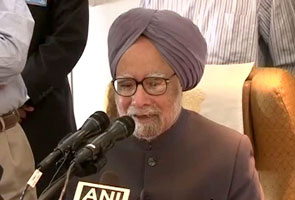 PM to meet Nawaz Sharif in New York, 'surprising' says BJP
PM to meet Nawaz Sharif in New York, 'surprising' says BJPPrime Minister Manmohan Singh has officially confirmed a bilateral meeting with Pakistan Prime Minister Nawaz Sharif despite a severe strain in ties.

